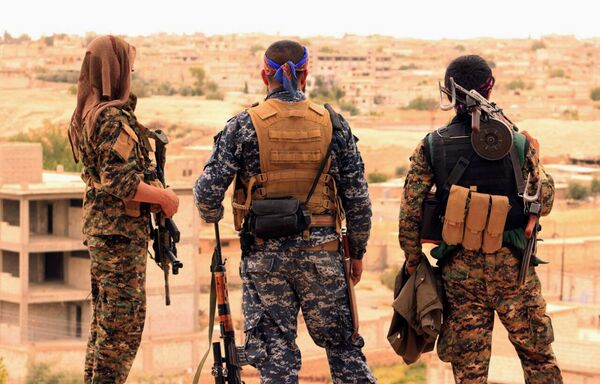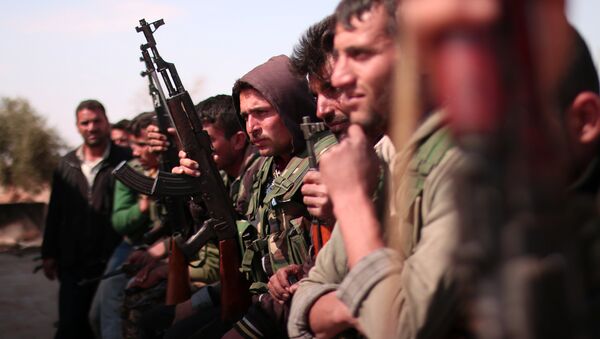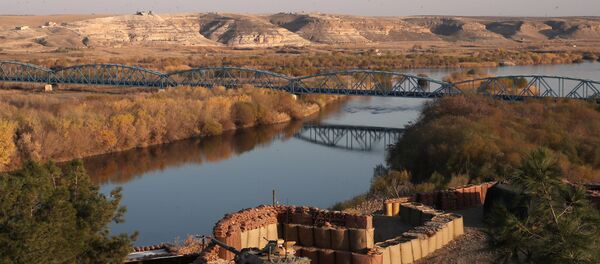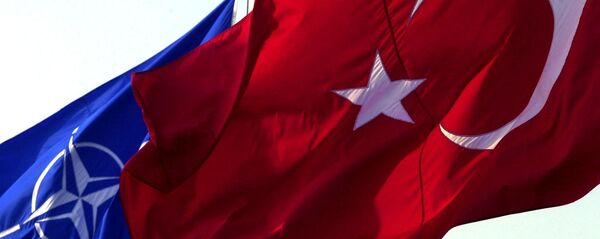Tensions continue to flare over the reported US plan to create a 30,000-strong "border force" in the regions controlled by the Kurdish-dominated Syrian Democratic Forces (SDF) in the Arab Republic.
On January 16, Turkish Foreign Minister Mevlut Cavusoglu warned his US counterpart Rex Tillerson and Secretary of Defense James Mattis during a summit in Vancouver, Canada, that if the US begins forming the new army in northern Syria the US-Turkish relationship would be "irreversibly harmed."
Turkey views Washington's allies — Kurdish People's Protection Units (YPG) and Democratic Union Party (PYD) — as affiliates of the Kurdistan Workers' Party (PKK) designated as a terrorist organization by Ankara.
On January 14, Colonel Ryan Dillon, the spokesman for Combined Joint Task Force Operation Inherent Resolve, announced the plan to establish a new military force in Syria together with the SDF.
READ MORE: SDF Spokesman: 'US Is Positive About the Idea of a Federal Syria'
According to Yenicag Gazetesi, Mattis recommended Cavusoglu not to believe media reports about the formation of the "border force."
What's Behind Border Security Force Reports?
Sputnik asked Philip Giraldi, a former counter-terrorism specialist and military intelligence officer at the CIA, and Christopher Assad, a Canada-based political observer and writer of Syrian origin, to comment on the controversial matter.
What is actually behind the US plan to form the "border force" and could these efforts translate into the creation of an independent Kurdish "state" in Syria?
"The intention of the US is to remain relevant in Syria by having an armed force on the ground," Giraldi told Sputnik. "The secondary intent is to reward the Kurds for their being used in the fighting in Syria. But the US knows that the creation of an actual territorial state run by the Kurds would result in a Turkish invasion, so it will not allow it to go that far."
"Yes, it is a minefield dealing with Turkish sensitivities and I think Washington will back down rather than risking an actual incursion by the Turkish Army," the CIA veteran opined, adding "Washington does not have either the resources or the will to oppose the Turks."
So, according to him, the US is likely, after all, to meet the aspirations of the Turks: "[Washington] will probably agree to disarm the Kurds or limit the weapons they are allowed to have."
Earlier, Turkish President Recep Tayyip Erdogan signaled that Ankara would nip the US-SDF initiative in the bud, citing the Turkish upcoming operations against the Kurds in Afrin and Manbij.
Commenting on Erdogan's warning, the former intelligence officer noted that the Turkish president is not bluffing.
"The Turks see the Kurdish threat as a vital national interest and they will not be distracted by Washington," Giraldi believes. "Washington will have to back down as it does not have either the resources or the will to oppose the Turks."

Washington 'Does Not Hold Many Cards' in Talks on Syria
It appears that Turkey and the US may end up in a confrontation over the Kurdish issue if they fail to find common ground.
According to Giraldi, "there is a diplomatic solution by agreeing to some kind of limited autonomy for the Kurds in Syria similar to what prevails in Iraq."
The CIA veteran assumed that the Turks "will likely insist that it includes a strong condemnation of the PKK and its activities to give it a legal sanction to intervene if it feels that the situation is becoming dangerous."
"That said, it is difficult to say where the American negotiators, if there are actual negotiations on the issue, will do," the former intelligence officer emphasized. "They do not hold many cards as the talks on Syria's future move forward."
'US Won't Allow Turkey to Dislodge SDF From Its Footholds in Syria'
For his part, Christopher Assad believes that Turkey's hand in Syria is not that strong. According to the political observer, Washington is highly interested in its Kurdish allies on the ground since they could help the US "carve out a strategic corridor for oil and gas pipelines."
However, he shares Giraldi's view that the US leadership wouldn't support the creation of an independent Kurdish entity in Syria.
At the same time "the US will give Ankara nothing except the promise that they will not allow the SDF to bother them if Turkey promises to continue supporting the US agenda in the region," Assad said.
"Ankara's payback is transit and export fees of the oil and gas to be shipped from Iskenderun (was a Syrian port until 1939) to Europe, the political observer suggested.
As for the Afrin and Manbij operations, Assad threw into doubt the assumption that Washington would allow their NATO ally to expel Kurdish militias from their footholds in Syria: "Erdogan will be allowed to do anything he wants except dislodge the SDF from certain designated areas."
The United States has been carrying out its military campaign in Syria since 2014, leading a coalition of nations. However, the coalition's activities have not been authorized by the UN or the legitimate Syrian government, making the US military presence in the region completely illegal.
The views and opinions expressed by Philip Giraldi, Christopher Assad, and Ekaterina Blinova are those of the contributors and do not necessarily reflect those of Sputnik.




